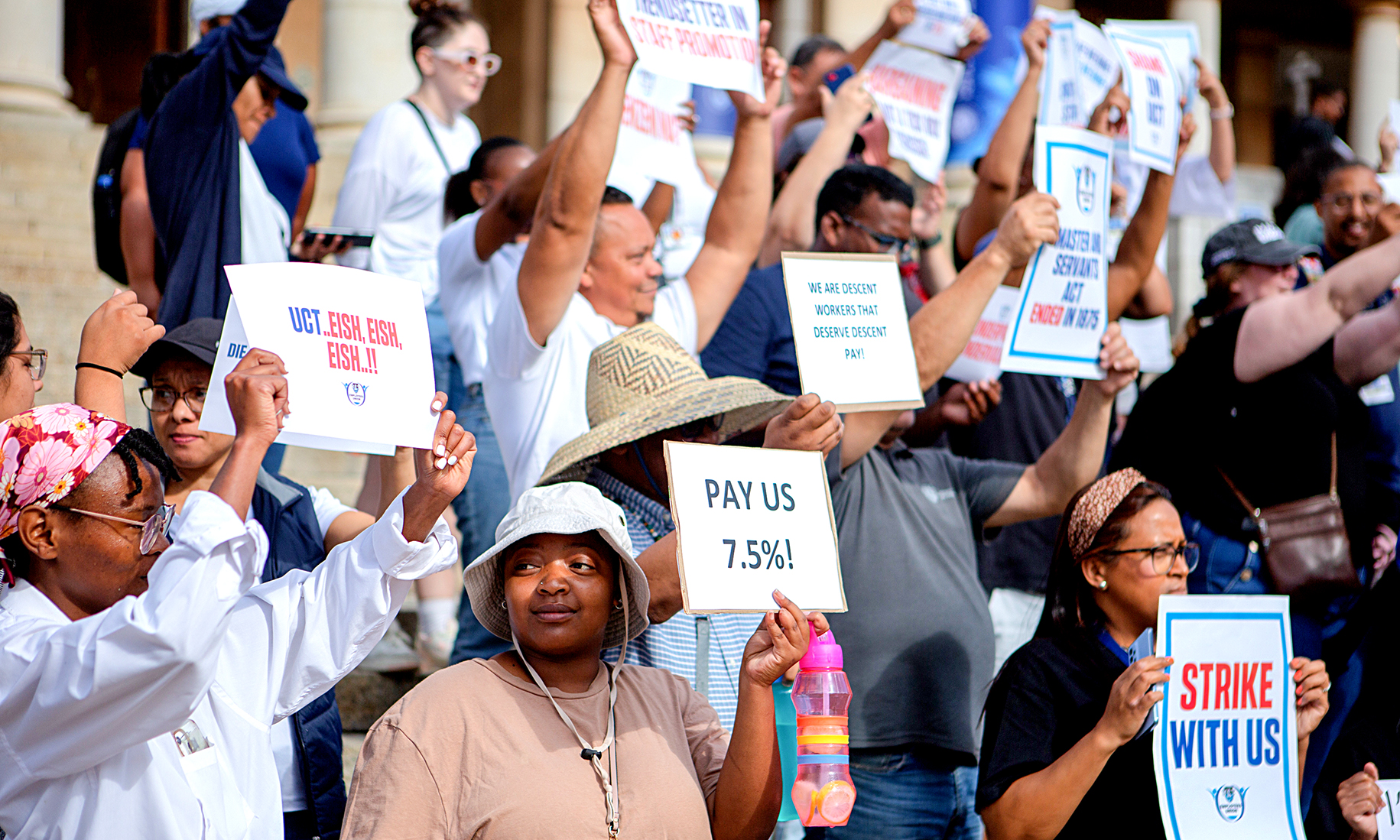Finance minister Enoch Godongwana’s October mini-budget underscores how difficult the government is finding it to wrestle down the cost of paying SA’s 1.3 million public servants. And the pending pay negotiations with trade unions representing public servants will be equally, if not more, difficult.
Judging from the numbers in Godongwana’s budget, it is guaranteed that public servants will receive pay increases in their bank accounts from 1 April 2025. What remains unclear is the extent of pay increases that public servants, including teachers, nurses, doctors, police and prison officers, and others, will settle on with the government.
 Minister of Finance Enoch Godongwana. (Photo: Gallo Images / Die Burger / Jaco Marais)
Minister of Finance Enoch Godongwana. (Photo: Gallo Images / Die Burger / Jaco Marais)
The budget documents show that an additional R48.47-billion has been allocated for the 2025/6 fiscal year for pay increases and potential pressures arising from compensating public servants. The additional allocation will bring the total cost of compensation for the upcoming fiscal year to R798.3-billion, which is the single largest component of the government’s total spending. This compensation cost gobbles up 32% of spending, which is set at R2.5-trillion during 2025/6.
It means that government spending is regressive as paying public servants comes at the expense of pro-investment and growth measures (including building roads and other infrastructure), and paying down debt so that public finances are put on a sustainable path.
Read more: GNU woos private sector to boost infrastructure projects for job creation
Over the past five years, the Treasury has been attempting to stabilise or even reduce the remuneration cost for public servants, with great difficulty. This balancing act will remain difficult this year.
The Treasury insists on awarding pay increases that are not well above the consumer inflation rate — in fact, it caps pay adjustments at the inflation rate plus 1%. On top of this rate and even before a deal is struck with trade unions, public servants automatically receive a 1.5% adjustment in their pay every year, which is known as “pay progression”. A “pay progression” is ordinarily awarded to public servants for their years of service and performance. It is factored in every year as part of a remuneration package.
Pay negotiations are playing out at the Public Service Co-ordinating Bargaining Council (PSCBC), where conditions of employment in the public sector are negotiated between the government and public sector trade unions. The government offered to increase pay by 3% in 2025, which was rejected by trade unions for being “too low”. There was a proposal at the PSCBC-facilitated process for the government to sweeten its offer to 4.7%.
 Nehawu members protest outside Charlotte Maxeke Hospital in Johannesburg on 8 March 2023. (Photo: Gallo Images / Fani Mahuntsi)
Nehawu members protest outside Charlotte Maxeke Hospital in Johannesburg on 8 March 2023. (Photo: Gallo Images / Fani Mahuntsi)
During a press briefing on 30 October, before he tabled the budget in Parliament, Godongwana said the government was yet to embrace and endorse the proposal to settle at 4.7%, adding that the “proposal was from a [PSCBC] facilitation process [and] it’s not necessarily a full offer on the table”. Public sector trade unions are also surveying their members on whether to accept the 4.7% offer, which is significantly lower than their initial demand of 12%, which was later reduced to 7.5%.
All indications are that the government’s offer is set to be rejected by most public servants. Daily Maverick understands that most unions including the Public Servants Association, which represents more than 245,000 public servants, have rejected the government’s 4.7% offer. The next step is for the unions to go back to the PSCBC to further engage.
Another tango expected at the PSCBC
At further PSCBC talks, trade unions are likely to stick to their 7.5% demand to test what they can get away with. The government might then push back with an offer it can afford (the 4.7% or maybe 6% if it’s generous). What the government can afford often upsets unions because it has been pared down. Then unions might become upset and threaten to strike. Either party then caves in. This dance is expected in the coming weeks or until a new fiscal year begins in April next year.
 Thousands of public sector workers march to Parliament in Cape Town on 10 August 2010. (Photo: Gallo Images / Foto24 / Lulama Zenzile)
Thousands of public sector workers march to Parliament in Cape Town on 10 August 2010. (Photo: Gallo Images / Foto24 / Lulama Zenzile)
An analyst close to government processes said public sector remuneration was complex as it required “a delicate balance” between attracting and retaining skilled personnel in the state, while also ensuring fiscal sustainability and promoting economic growth.
Green shoots in the public sector pay debate
The Treasury insists on holding the line on total remuneration cost as it has introduced a voluntary early retirement programme that will target 30,000 older and non-essential public servants over the next two years. Treasury Director-General Duncan Pieterse said the programme still depended on whether public servants would voluntarily retire, and if they did, there were cost savings to be realised.
It is assumed that 12,000 public servants will retire in the first year and 18,000 in the second year. The Treasury hopes to save R2-billion each year from the initiative.
The downside of this is that provincial education and health departments are likely to be disappointed as they have been hoping for more resources to preserve headcounts given the Treasury’s failure to fully fund them for the cost of the 2023 pay agreement. DM




 Thousands of public sector workers march to Parliament in Cape Town on 10 August 2010. (Photo: Gallo Images / Foto24 / Lulama Zenzile)
Thousands of public sector workers march to Parliament in Cape Town on 10 August 2010. (Photo: Gallo Images / Foto24 / Lulama Zenzile) 